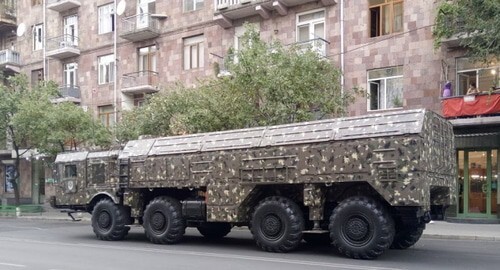Baku and Yerevan analysts dispute about use of "Iskanders" in Karabakh conflict
While demining the city of Shusha, Azerbaijani sappers have found fragments of "Iskander" missiles. Some experts assert that this type of missiles is exclusively among Russia's weapons. The scandal around the "Iskander" missile complexes may seriously harm Moscow's image as a mediator in the settlement of the Karabakh conflict, experts in Baku believe. Their colleagues in Yerevan parry that Azerbaijan is using the "Iskander" issue for its political purposes.
In late March, at demining Shusha, fragments of two exploded missiles were found. It was established that they belonged to "Iskander" missiles, the "caliber.az" reported.
In February, President Ilham Aliev stated that Azerbaijan did not fix the use of "Iskanders" during the autumn aggravation of the Karabakh conflict. The Russian Ministry of Defence (MoD) has also denied the use of "Iskanders".
In the opinion of an Azeri military analyst, the "Iskander" missile could have been struck on November 6-7, when Shusha came under the control of Azerbaijani troops. He believes Moscow will not publicly admit to providing Armenia with "Iskander-M" complexes, which would mean admitting a violation of international obligations.
Ilham Ismail, the head of the Centre for Security Studies, believes that Russia is directly responsible for the strikes on Azerbaijan. He does not rule out that Moscow took this step in order to save its historical ally from the final defeat.
This article was originally published on the Russian page of 24/7 Internet agency ‘Caucasian Knot’ on April 6, 2021 at 02:24 am MSK. To access the full text of the article, click here.






![Tumso Abdurakhmanov. Screenshot from video posted by Abu-Saddam Shishani [LIVE] http://www.youtube.com/watch?v=mIR3s7AB0Uw Tumso Abdurakhmanov. Screenshot from video posted by Abu-Saddam Shishani [LIVE] http://www.youtube.com/watch?v=mIR3s7AB0Uw](/system/uploads/article_image/image/0001/18460/main_image_Tumso.jpg)